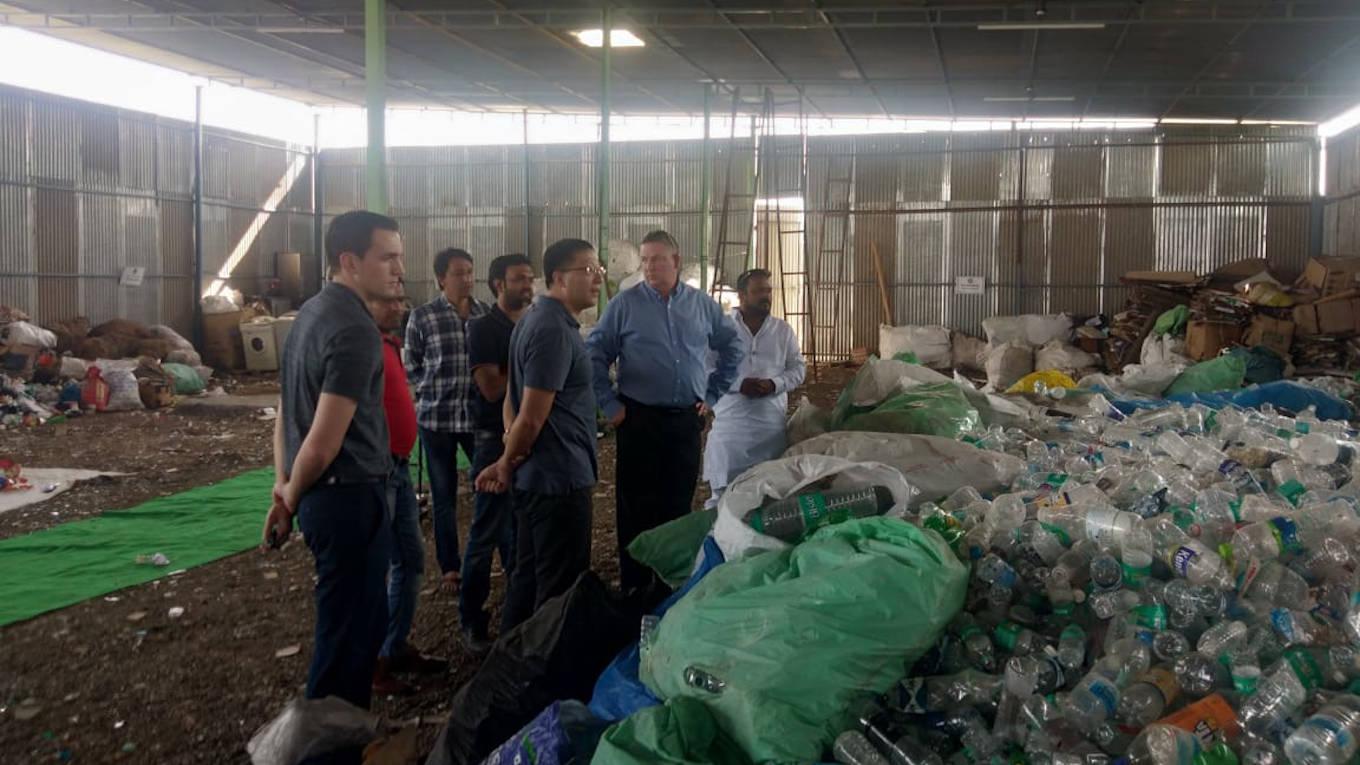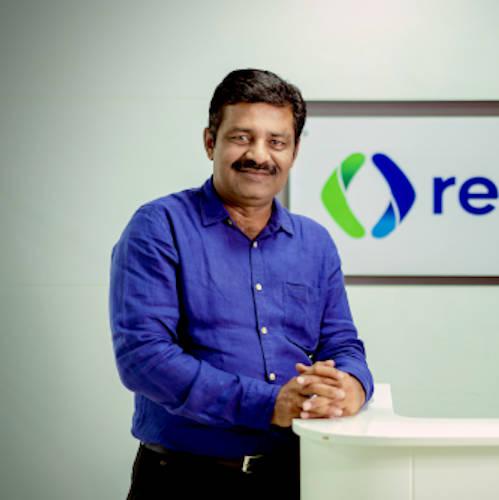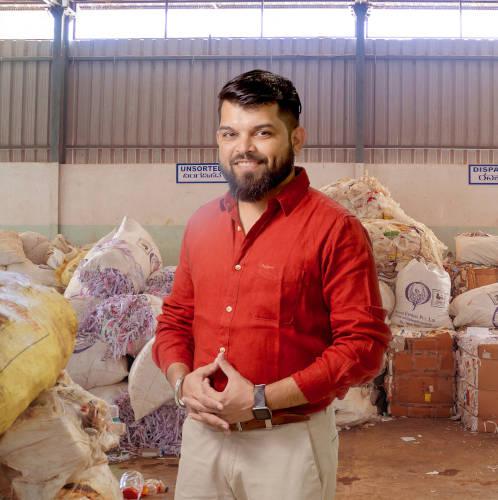Streamlining waste management
Deshpande did his research and decided that waste management, an industry estimated to be worth $14 billion in India by 2025, could be the next big thing for him. Along with his former associates Abhishek Deshpande and Anirudha Jalan, Abhay started Recykal in 2017, a waste collection company that works with rag-pickers, who collect waste from residential houses and deposit refuse at recycling centres.
To streamline the process, Recykal launched an app called Uzed, where individuals could schedule waste pick-ups. Recycling waste involves multiple parties – rag-pickers, waste collection centres, municipalities, recyclers and bulk waste generators, which include schools, hotels, restaurants, factories and shopping complexes.
Soon, the company realised that one product or app could not cover everyone’s needs and particularities. As Recykal rejigged its business, the promoters felt that they should approach bulk waste generators, who could provide at least 10 kg of trash per day. That way, it would be economically viable for the company, while also maintaining a steady supply for recyclers. In 2019, Recykal pivoted to a B2B model, where it built products for everyone involved in recycling.
Abhishek, a self-starter, believes in turning ideas into reality. Thinking differently and putting in his best efforts to attain the unattainable is what motivates him to continuously improve in this ever-evolving ‘start-up’ industry. Prior to Recykal, Abhishek had worked for the Accor group of hotels as operations manager. The wasteful use of single-use plastic items (such as plastic cups/water bottles, etc) in hotels and their imprudent disposal process made him think about environmental concerns.
“Embracing a more circular economy is crucial in determining our response to the problem of waste management that we are currently facing,” explains Abhishek Deshpande. “Through our digital platforms, such as Marketplace, Smart Centre Solutions and EPR LOOP, Recykal is channelling over 10,000 tonnes of recyclables every month, with plans to scale and influence more than two million tonnes of plastic annually by 2025.”
Recykal collects waste from various segments like consumers, businesses, aggregators and the informal sector, which are channelised to recyclers, coprocessors and cement kilns. “We have changed the status quo of doing offline transactions and have converted them into platform-based online transactions for better transparency,” says Abhishek, adding that The Circulars Accelerator, the world’s premier platform that recognises individuals and organisations active in the field, is making an effort and notable contribution to the circular economy, in collaboration with the WEF.
HUL was Recykal’s first client. As of today, Recykal works with more than 75 brands, including Marico, Godrej Consumer, Pepsi, Unilever, LG, Panasonic, Amul, Decathlon, UNDP and Tata Beverages, to name a few. “We are glad to be associated with Recykal and its team,” affirms Karunakar Avuram, DGM, sustainability, Godrej Consumer Products. “Targets assigned by us are successfully accomplished within the timeline, along with receipt of supporting documentation. We appreciate their professionalism and conduct.”
Good performance
“We found Recykal’s performance to be good,” observes Bipin Odhekar, head, sustainability & operational excellence, Marico. “And, their team has shown proactive commitment with timely achievement of fulfilment targets.”
Says Abhishek Deshpande: “The recycling market in India is expected to be more than $50 billion by 2025 and, with 17.5 million tonnes of plastics waste streams entering India in 2021 and with 5.1 MT of electronics waste streams being generated, there is a $15 billion-plus earning opportunity, handling these categories of waste.”
“This space has seen unprecedented growth due to the introduction of progressive laws – extended producer responsibility (EPR), for example, which makes 10,000-plus brand owners in India comply with its obligations and ensure that waste streams are channelised to the right demand side destinations. This has further catalysed the recycling (and co-processing) capacity in India, paving the way for improved recycling outcomes,” says Abhay.
The value proposition they offer is the EPR fees charged to brand owners towards fulfilment of EPR obligations through Recykal’s unique offline/digital enabled offering. Recykal’s EPR Loop provides for the highest value of traceability for brand owners and for pan-India fulfilment. “Through our Recykal digital platforms we have worked with various stakeholders across the waste value chain, digitising their transactions and channelising over 23,727 tonnes of waste, including paper, plastic, paper waste during April 2019 to March 2020,” he adds.
“We have changed the status quo of doing offline transactions and converted them into platform-based online transactions for better transparency. The value we create to the respective stakeholders translates to a bigger agenda in creating social, environmental and economic impact and also enables different stakeholders to adopt circular practices.”
“For 2021, we have targeted channelising volumes in excess of 300,000 tonnes, 80 per cent of which would be plastic and 20 per cent e-waste,” says Abhay. “Empower the informal sector sellers pan-India to find better prices and access to formal recycling streams within 2021. Over time, branch out into many new categories, within plastics and outside. In the long term, leverage innovative solutions such as DRS to bring about a major improvement in recycling outcomes. Our Recykal points have been highly appreciated by brands and recyclers alike for their cutting-edge cloud data integrations to marketplace and the EPR loop. By the end of 2024-25, we plan to have at least 100 such centres across India.”
Fast-moving consumer goods (FMCG) corporations are a predominant force behind the throw-away economic model, driving the plastic pollution crisis. Recognising the potential for change, the government has set up an extended producer responsibility policy to encourage manufacturers or brand owners to create markets for reuse or recycling of materials.
To support FMCG and electronic brands run their consumer awareness and take-back programmes and comply with extended producer responsibility (EPR) rules, Recykal is ensuring convergence of solutions, transparency and traceability through the use of digital technology.




































